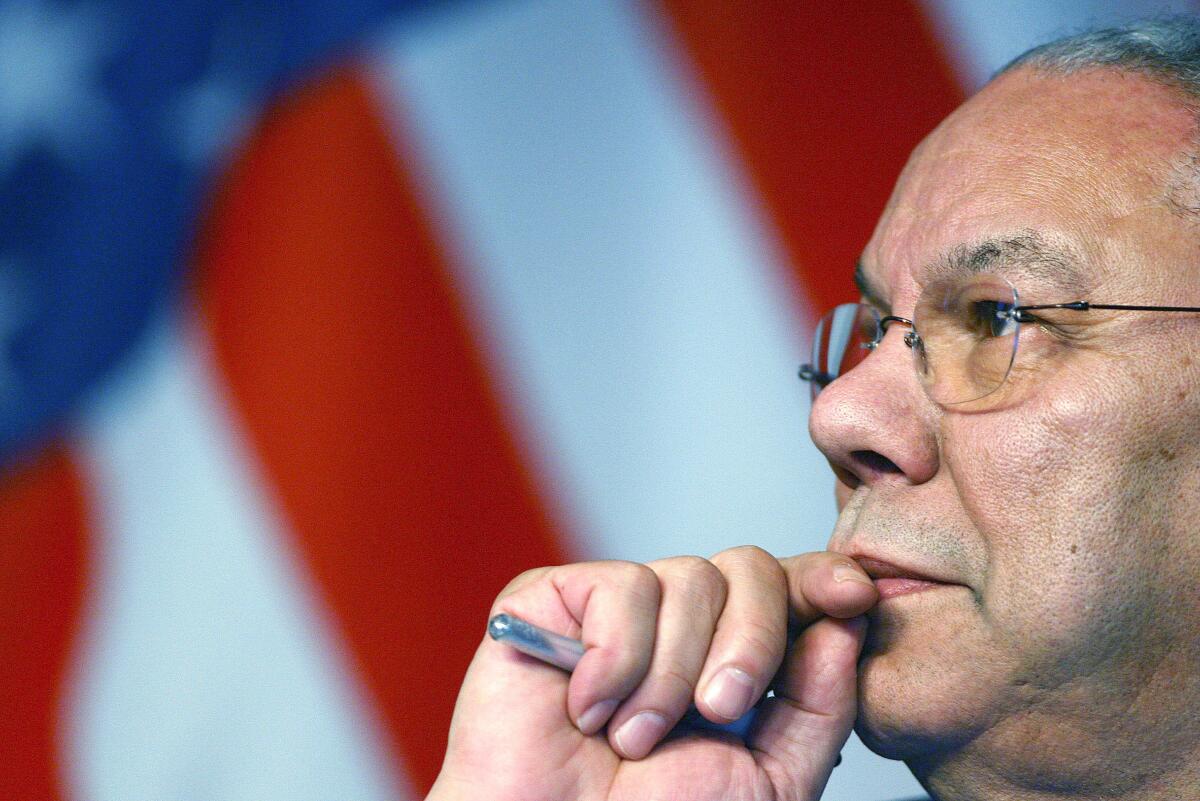Powell betrayed his values once. Republicans backing Trump today have none to betray

- Share via
Colin L. Powell led an extraordinary life: a son of immigrants who rose from the Bronx to lead the United States in both arms and diplomacy, the first Black American to be a White House national security advisor, chairman of the Joint Chiefs of Staff and secretary of State. In death he is rightly heralded — except for the one thing he called “a blot” on his record.
That stain, as the Associated Press described it, was described high in his obituaries. And today’s Republican “leaders” should pay heed as they contemplate their own epitaphs.
Powell, as President George W. Bush’s first secretary of State, acquiesced in 2003 to become the administration’s international salesman for war against Iraq. He and his advisors had doubted the intelligence reports claiming that Saddam Hussein was building an arsenal of weapons of mass destruction — and distrusted the warmongering Vice President Dick Cheney and Secretary of Defense Donald Rumsfeld. Yet Powell proceeded with his now-infamous televised speech to the United Nations Security Council, as many of us who covered him cringed, unpersuaded that he was persuaded by the intel even as he sold it to the world.
Two years later, after the intelligence indeed proved wrong and U.S. troops were dying in a quagmire, Powell acknowledged his “painful” role in starting a war under false pretenses. “It’s a blot,” he told Barbara Walters in an ABC News interview, and it “will always be a part of my record.”
Nearly a generation later, Republican officeholders in Washington and the states show no such self-awareness and contrition as they’ve allowed themselves to be swept up by the prevailing political pressures. They continue to deny, excuse and otherwise normalize the threat to democracy that is Donald Trump and his Big Lie about his stolen reelection “landslide.” They contribute, or at a minimum acquiesce, in undermining much of the nation’s faith in elections. And most of these Republicans don’t really believe what they’re saying, least of all in supporting a man whom many of them revile. They concede as much privately.
Powell condemned Trump early on as “a national disgrace and an international pariah,” and only grew further persuaded with time of the man’s unfitness for office, and said so. Unlike him, Trump’s Republican enablers and sycophants — Sens. Lindsey Graham of South Carolina, Ted Cruz of Texas, Charles E. Grassley of Iowa and so many more — have tried to bury their own past denunciations of Trump. I promise them, however, that obituary writers will resurrect those words and document their craven reversals. Among the damning quotes from before these men had their come-to-Trump conversions: Trump is “a race-baiting, xenophobic religious bigot” (Graham) and “a pathological liar” who’s an “utterly amoral” “narcissist.” (Cruz).
Those words were true when they were uttered more than five years ago, and they remain truer than ever, validated many times over by Trump’s behavior both in office and as a sore loser, the first president in U.S. history to refuse to acknowledge his electoral defeat and permit the peaceful transfer of power. Yet Republican leaders are complicit in his assault on elections both by their acts — sham “audits,” gross exaggerations of 2020 “irregularities,” state laws to suppress votes and, as in California’s gubernatorial recall, preemptive claims of fraud even before results are in — and by their failures to act and speak out.
Should this trend continue to weaken the foundations of democracy, so that Americans no longer accept an election result with which they disagree — that already describes most Republicans — then the Republican Party’s leaders will have worse than blots on their records. Their mistakes will not be exceptions to otherwise laudable service. The stain will define their legacies.
More to Read
A cure for the common opinion
Get thought-provoking perspectives with our weekly newsletter.
You may occasionally receive promotional content from the Los Angeles Times.










